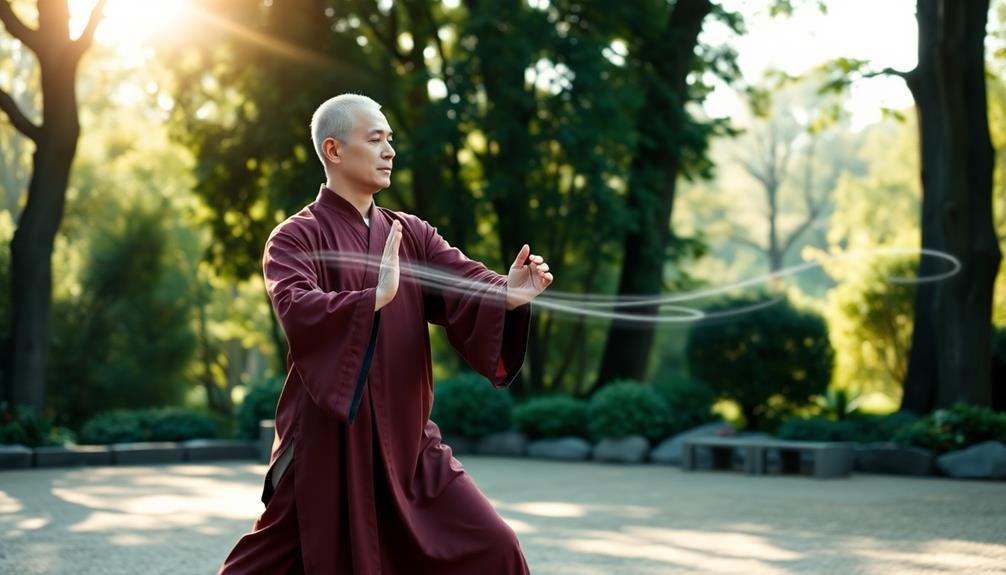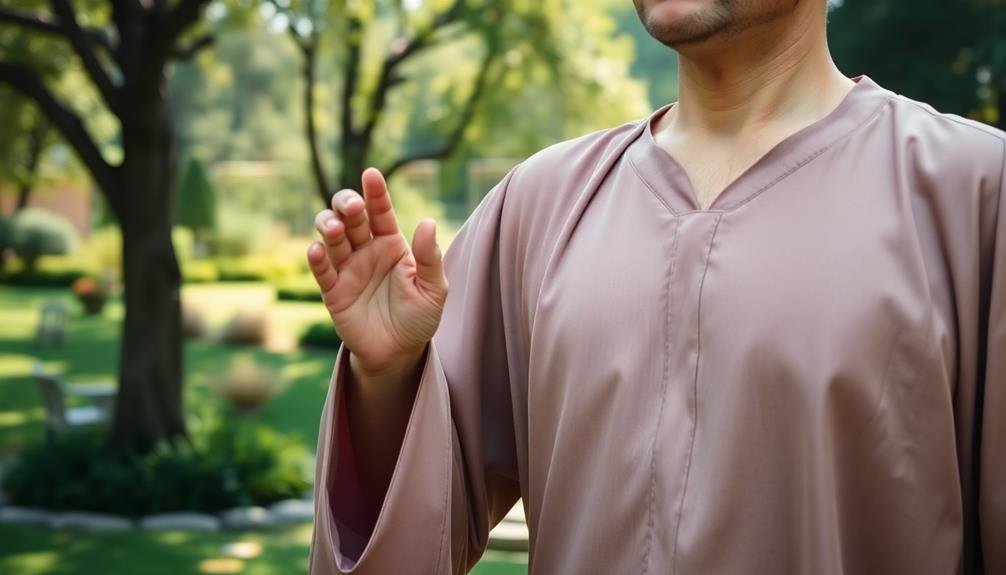Qigong calms anxious minds through a powerful blend of ancient wisdom and modern science. You'll experience a natural relaxation response as you engage in slow, coordinated movements and focused breathing. This moving meditation activates your vagus nerve, lowering heart rate and reducing stress hormones. Qigong's emphasis on mindfulness shifts your focus from worries to the present moment, easing anxiety symptoms. The practice also improves the flow of qi, or life energy, essential for overall well-being according to traditional Chinese medicine. By incorporating Qigong into your daily routine, you'll tap into a 5,000-year-old tradition that offers profound benefits for mental and physical health. Discover how this ancient practice can transform your approach to stress management.
Understanding Qigong's Calming Effects

Qigong's ancient practice offers a powerful antidote to modern anxiety. This Chinese system of coordinated body posture, movement, breathing, and meditation works by activating your body's natural relaxation response. As you perform slow, deliberate movements and focus on your breath, you're engaging in a form of moving meditation that calms your nervous system.
When you practice Qigong, you're stimulating the vagus nerve, which plays an essential role in regulating your body's stress response. This activation helps lower your heart rate, reduce blood pressure, and decrease cortisol levels.
You're also improving the flow of qi, or life energy, throughout your body, which traditional Chinese medicine believes is vital for overall health and well-being.
The mindfulness aspect of Qigong helps you stay present, shifting your focus away from anxiety-inducing thoughts about the past or future. You're training your mind to concentrate on the here and now, which can greatly reduce anxiety symptoms.
Regular practice strengthens this ability, making it easier for you to manage stress and anxiety in your daily life.
Ancient Roots of Qigong Practice
Thousands of years ago, the roots of Qigong took hold in ancient Chinese culture. This practice emerged from Taoist and Buddhist traditions, blending physical movements, breathing techniques, and meditation. You'll find its origins intertwined with Traditional Chinese Medicine, which views health as a balance of energy within the body.
Qigong's development spans over 5,000 years, evolving through various dynasties and philosophical schools. In its early forms, it was closely linked to martial arts and spiritual practices. As it spread, it became a tool for health maintenance and longevity.
Ancient texts like the "I Ching" and "Tao Te Ching" influenced Qigong's principles, emphasizing harmony with nature and the cultivation of internal energy, or "qi." You'll notice these concepts reflected in modern Qigong exercises.
Throughout history, Qigong has adapted to serve different purposes, from healing to martial prowess. It's survived periods of suppression and flourished during times of imperial support.
Today, you're practicing a discipline that carries the wisdom of countless generations, refined and preserved through millennia of Chinese cultural evolution.
Breathing Techniques for Anxiety Relief

Central to Qigong's anxiety-relieving power are its breathing techniques. These practices help you regain control of your body's stress response, calming your nervous system and easing anxious thoughts.
By focusing on your breath, you'll shift your attention away from worries and into the present moment.
Qigong breathing emphasizes slow, deep breaths that engage your diaphragm. You'll inhale through your nose, allowing your belly to expand, then exhale slowly through your mouth. This pattern activates your body's relaxation response, lowering heart rate and blood pressure.
To incorporate Qigong breathing into your daily routine:
- Practice "belly breathing" for 5 minutes each morning
- Use the "4-7-8" technique during stressful moments: inhale for 4 counts, hold for 7, exhale for 8
- Try "Lion's Breath" to release tension: inhale deeply, then exhale forcefully with your mouth wide open and tongue out
Mind-Body Connection in Qigong
At the heart of Qigong lies a powerful mind-body connection that sets it apart from many other forms of exercise. When you practice Qigong, you're not just moving your body; you're actively engaging your mind and spirit in the process. This integration allows you to tap into your body's innate healing abilities and cultivate a deeper sense of self-awareness.
As you perform Qigong movements, you'll focus on your breath and internal energy flow, known as "Qi." This mindful attention helps you become more attuned to your body's sensations and needs. You'll learn to recognize areas of tension or imbalance and use specific techniques to address them.
The mind-body connection in Qigong also extends to emotional well-being. By synchronizing your thoughts, movements, and breath, you can release pent-up emotions and reduce anxiety. You'll develop a greater sense of control over your mental state, learning to calm your mind through physical practices.
Moreover, Qigong's emphasis on slow, intentional movements encourages you to be present in the moment, reducing rumination and worry. This mindfulness aspect can greatly impact your overall mental health and stress levels.
Incorporating Qigong Into Daily Life

Understanding the mind-body connection in Qigong is just the beginning. To truly benefit from this ancient practice, you'll need to incorporate it into your daily life. Start by setting aside dedicated time each day for Qigong exercises, even if it's just for 10-15 minutes. Choose a quiet, comfortable space where you can focus without distractions.
As you integrate Qigong into your routine, remember these key points:
- Consistency is key: Practice daily, even if it's for a short duration.
- Listen to your body: Adjust movements and intensity based on how you feel.
- Combine with other activities: Incorporate Qigong principles into everyday tasks.
You can practice Qigong while waiting in line, sitting at your desk, or even during your commute. Focus on your breath and body awareness throughout the day.
As you become more familiar with Qigong techniques, you'll find opportunities to apply them in various situations, helping you manage stress and anxiety more effectively. Over time, Qigong will become a natural part of your life, providing a constant source of calm and balance.
Frequently Asked Questions
How Long Does It Take to See Results From Practicing Qigong?
You'll likely notice initial benefits within a few weeks of regular qigong practice. However, significant results can take 2-3 months. Consistency is key. You'll experience gradual improvements in your physical and mental well-being over time.
Can Qigong Be Harmful if Practiced Incorrectly?
Yes, qigong can be harmful if practiced incorrectly. You're at risk of injury if you overexert yourself or use improper form. It's essential you learn from a qualified instructor and listen to your body's signals while practicing.
Is Qigong Suitable for People With Physical Limitations or Disabilities?
Yes, qigong can be suitable for you if you have physical limitations or disabilities. You'll find many adaptable exercises that can be done sitting, standing, or even lying down. It's best to consult an experienced instructor for personalized guidance.
Are There Any Religious or Spiritual Beliefs Required to Practice Qigong?
You don't need any specific religious or spiritual beliefs to practice qigong. It's accessible to everyone, regardless of faith. While qigong has philosophical roots, you can approach it purely as a physical and mental exercise if you prefer.
How Does Qigong Compare to Other Stress-Reduction Techniques Like Meditation or Yoga?
You'll find qigong shares similarities with meditation and yoga, focusing on breath and movement. It's unique in its emphasis on energy flow. Like other techniques, it reduces stress, but it's particularly effective for promoting overall well-being.
In Summary
You've now explored how qigong can calm your anxious mind. By tapping into this ancient practice, you're embracing a powerful tool for stress relief. Remember, it's the combination of focused breathing, gentle movements, and mindfulness that makes qigong so effective. As you incorporate these techniques into your daily routine, you'll likely notice a growing sense of peace and balance. Don't hesitate to start small – even a few minutes of qigong can make a difference in your day.





Leave a Reply